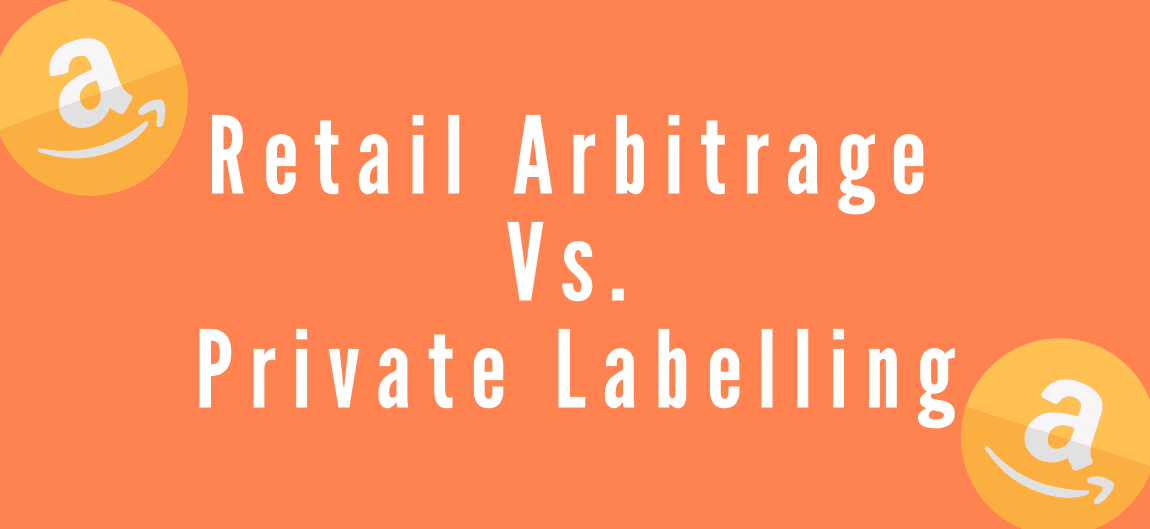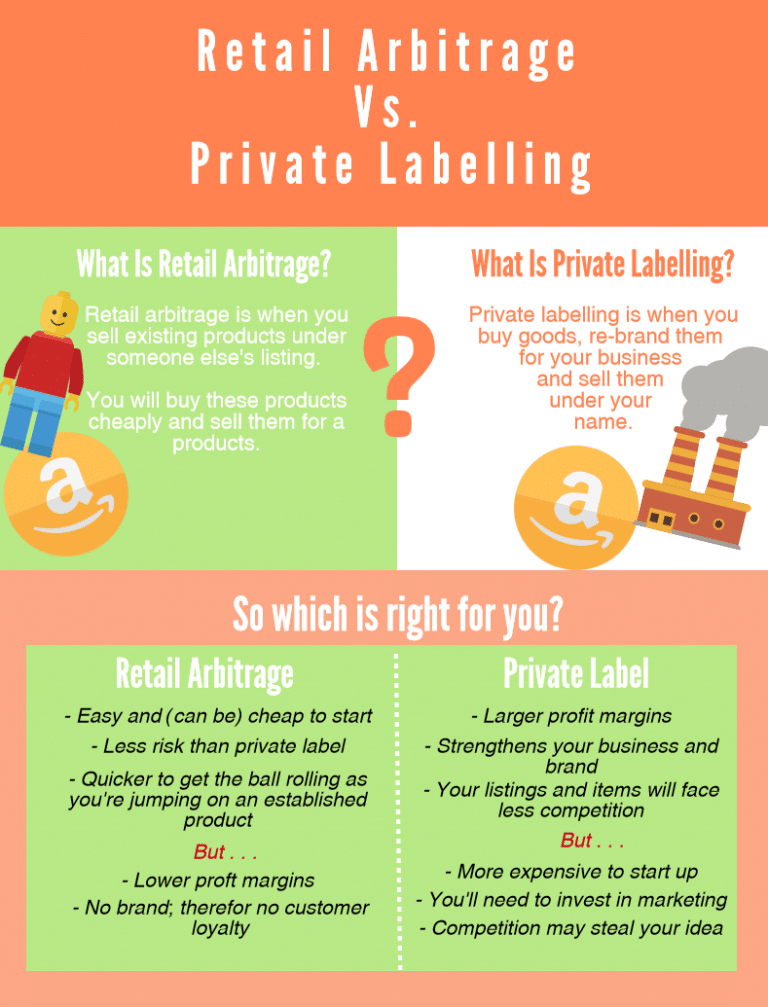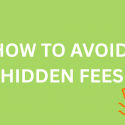If you’re thinking about importing to sell on Amazon, there are two ways you can go…private label or selling a product already being sold – AKA retail arbitrage.
-
What Is Private Label?
Private labelling is when you purchase goods from a manufacturer, place your logo and branding on them and resell them. An example of this is purchasing a product from Alibaba, repackaging it and selling it under your business’s name.
Wait…is this legal?
Yep. If you buy wholesale from a factory, this is perfectly legal. You can’t just steal something off a rack from PC World and sell it as your own, though.
Arbitrage – the alternative to private label
The alternative to Private Labelling, when on Amazon, is to become an additional seller of a particular product. This is known as “retail arbitrage”. Retail arbitrage is commonly known – many people use Amazon to sell goods that they purchase on clearance, for example, at a higher price online. The more common example of retail arbitrage for importers is that they will source an item on Alibaba and sell it on Amazon under an existing listing.
As you can see here, each of these goods has multiple buying options. Essentially, this is what retail arbitrage is – you may find an item like one of these on Alibaba, buy it and instead of creating your own brand and making the packaging etc. you can just list yourself as an additional seller on an existing listing.
-
Private Labelling Pros & Cons
Pros
- As it’s your business’s logo on it, your business is the one growing and gaining recognition. We’ve touched on this subject before in this blog when talking about FBA’s pros and cons; one of the pitfalls of using Amazon is that it is much harder for your business to grow. It’s (relatively) easy to increase sales and profits, but when all’s said and done . . . what do you have off the platform? Not much. However, with private labelling, you can increase your brand awareness and create loyal customers.
- You can price higher – which means that you earn more! One of the problems with retail arbitrage is that you’re competing with other businesses over the same product. This leads to marginal profits and businesses constantly undercutting prices. With private labelling, you can create a brand – you can even create a premium brand.
- There’s typically less competition. Even with the nature of the listings, you’ll run into less competition when selling on Private Label because you’re the person who created the listing as opposed to one of many sellers that have jumped on to sell on it.
Cons
- More expensive. Starting up a private label company is more expensive than starting retail arbitrage. First of all, to even begin, you’ll need to buy a product – and in bulk too. If you’ve sourced this product overseas, then you’ll have to factor in the cost of shipping and Duty and Tax. From there, you’ll need to purchase branding and packaging and, if you don’t have the space at home, storage too. In addition to all this, you’ll probably need to spend some cash investing in marketing efforts too.
- Run the risk of failed products. This ties into the first point – when you’re reselling on Amazon, you can buy 1 of 100 different products to sell, but when you’re selling as a private label you usually have 100 of 1 product to sell. If you strike out and your product isn’t profitable . . . well, you’ll be stuck with a bulk load of goods that you can’t shift – and you’ll be out of pocket.
- Competition may steal your idea. Amazon is a competitive market full of people brandishing underhanded tactics to eliminate the competition – or at least capitalise on their success. As soon as you start to succeed, people will try to cut in on your business and they may even steal your ideas to achieve this.
- You’ll need to purchase barcodes. When you’re selling using a private label, you’re literally creating a brand new product on the market – that market being Amazon, which will not allow you to sell goods that don’t have a barcode. This means that you will need a barcode for your goods, so you’ll need to buy a barcode. This can be rather expensive if you’re buying discounts for multiple items.
-
Arbitrage Pros & Cons
Pros
- It can be cheaper to start-up. Depending on the way that you pursue retail arbitrage, you may not need as much start-up stock – so it can be a lot cheaper to start up.
- Lower risk. Due to the nature of the business model, you can buy goods that are already selling as opposed to buying a product that isn’t in demand and hoping it sells.
- Easier. Although no business is easy, it is easier to sell using retail arbitrage than to set up a brand and sell using Private Label.
- Don’t need to spend money on marketing! A point we’ve already mentioned is the fact that when you’re selling on an existing listing, you’ve already got a bit of a boost when it comes to sales – your goods are already being exposed. This means that you don’t need to spend money on marketing.
- It’s quicker to get the ball rolling. Due to all of these points, it’s quicker to get the ball rolling on a retail arbitrage business.
Cons
- Lots of competition. Because you’re simply adding your stock to a listing, you have to compete against the existing suppliers on the listing – and the original posters. This means a lot of competition.
- Lower profit margins. We’ve already mentioned the competition, but have you thought of how to beat it? As you can see, you’re all on one page – there’s no way for you to make your Amazon store stand out . . . except for lowering the price. This means that a lot of the profit margins are marginal, which in turn means that so are your earnings.
- No brand. This is a downside of selling on Amazon, but it’s one that you’ll especially feel if you sell using retail arbitrage – you have no brand or business development and absolutely no opportunity to develop one.
- No customer loyalty. This ties into the previous point; if you can’t develop a brand, your customers can’t identify and connect with you – so there goes any chance of having loyal customers that will follow you if you ever decide to leave the platform.
-
Retail Arbitage Vs Private Labelling
Now that you’re aware of what these business models do, let’s compare the two so that you can see which archetype is best for you!
-
Shippo
As you can see from above, there are pros and cons to both business models. Ultimately, it is up to you to decide which model is the best fit for your business.
If you need any help importing once you have decided, please contact us or grab a quote here!
Great shipping company to work with. I would recommend Shippo to anyone who is looking for a reliable company to take care of their shipping needs.Stanislava Dimitrova -
Latest Posts
Protect Yourself From Hidden Fees When Importing From China
0 commentsWe all want an all-inclusive quote when we’re offered a price right…? When it comes to importing this isn’t always the case. Shippo can make
LCL – How Will My Goods Be Delivered
0 commentsThe standard delivery offered when importing goods to the UK is kerbside. This means that the driver will park up outside your premises and it’s
FCL – How Will My Goods Be Delivered?
0 commentsAs with the standard deliveries, full container load deliveries are “kerbside” This means the container will arrive on the back of the truck and you’ll





